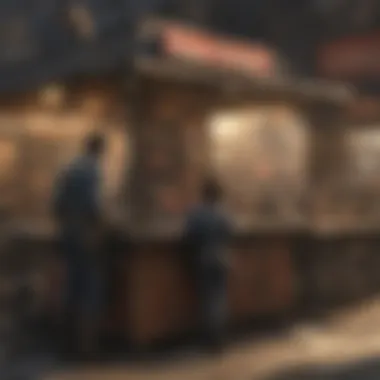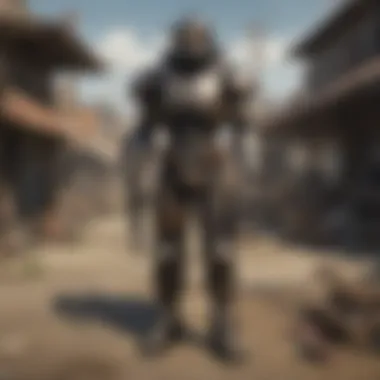The Importance of Screw Vendors in Fallout Games


Intro
The Fallout universe presents a rich tapestry, woven with survival, exploration, and resource management. A fundamental thread in this intricate weave is the presence of screw vendors. These unassuming characters—often overlooked amidst the chaos of post-apocalyptic life—serve crucial functions in gameplay mechanics and narrative depth. As the player trudges through the desolate landscapes, encountering mutated creatures and rogue factions, the role of screw vendors becomes even more significant than it may seem at first glance.
Through this article, we will dive into the multifaceted impact that screw vendors have on the Fallout series. From their economic influence on the crafting landscape to their narrative capabilities within the broader lore, understanding these characters enriches the player's experience in this vast world.
Lore Insights
Overview of the Fallout Universe
In the Fallout series, a dark alternate history unfolds. The world faced a nuclear apocalypse, leading to a societal collapse where resources are sparse and survival is paramount. Amidst this ruin, screw vendors emerge as a noteworthy element. They provide more than just materials; they are part of the storytelling, highlighting the resourcefulness of the wasteland's remaining inhabitants.
Key Historical Events in the Fallout Timeline
- The Great War - This catastrophic event marked the beginning of the post-apocalyptic landscape that defines Fallout. The conflict brought on a nuclear exchange that obliterated many cities, reshaping civilization.
- The Rise of Factions - In the aftermath, various factions emerged, such as the Brotherhood of Steel and the New California Republic. Each faction has its unique view on technology and resources, intertwining with the role of screw vendors.
These events set the stage for the need for trade and resource exchange, placing screw vendors right in the middle.
Deep Dive into the Backstory of Major Factions and Characters
Screw vendors often serve as a reflection of their respective factions. For instance, in the Mojave Wasteland, the Great Khans have their screw vendors whose character backgrounds are steeped in the lore of rebellion and survival. Each vendor holds stories of the past, revealing insights into their motivations and survival strategies. Understanding their backstories adds context to why these characters choose to engage in trade, driving home the survival theme that pervades the Fallout series.
Gameplay Tips and Strategies
Beginner's Guide to Playing Fallout Games
For new players, navigating the complex world filled with screw vendors can seem daunting. Here are a few pointers:
- Explore different settlements to meet various screw vendors; each brings unique items and prices to the table.
- Pay close attention to the barter skill; improving it can significantly affect trade outcomes with screw vendors.
Weapon and Armor Recommendations
While screw vendors primarily deal in materials, they often have weapons and armor for sale or trade. Familiarize yourself with legendary items like the AER14 Prototype Laser Rifle found via intricate trades, showcasing the possibilities if one interacts adequately with these vendors.
Tips for Efficient Resource Management
Managing resources is vital in Fallout. When engaging with screw vendors, remember:
- Prioritize: Understand what materials are essential for your crafting needs and focus your trades accordingly.
- Haggle: Don't just accept the first offer. Negotiate to maximize your inventory and resources.
Character Analysis
Detailed Profiles of Iconic Characters
Many screw vendors have their own unique narratives. Take Myrna, a screw vendor in Fallout: New Vegas; she’s not just selling screws; she reflects the struggles of surviving in the harsh conditions of the wasteland.
Relationships Between Characters in the Fallout Series
Screw vendors interact with key characters in the Fallout lore, often influencing player decisions and faction dynamics. For instance, their alliance with factions can directly impact questlines and player reputation.
Character Development and Evolution Across Games
As the Fallout series progresses, so too does the complexity of its characters, including screw vendors. For example, compare the more straightforward vendors in Fallout 1 to the richly developed characters in Fallout 4, showing how far the series has come.
"Screw vendors are often the unsung heroes of Fallout, illustrating the player’s need to adapt and survive in a world where resources are luxury."
News and Updates
Latest Announcements from Game Developers
The developers often tease new features related to vendors in upcoming DLCs. Keeping an ear to the ground on forums like Reddit can reveal vital information about new vendor interactions.
Patch Notes and Upcoming Releases
Every patch tends to tweak vendor inventories, adding new items and improving mechanics. Stay updated to ensure you’re making the most of these changes.
Community Events and Tournaments
Participating in events can lead to unique vendor interactions. Engage with the community for some exciting insider tips and exclusive items from event-specific vendors.


Fan Theories and Speculations
Popular Fan Theories about the Fallout Universe
Speculation around screw vendors often aligns with broader themes in the game. Some fans believe that their increased presence indicates a shift in game focus towards crafting and resource dependencies in future installments.
Discussion on Unresolved Plot Points
Questions remain about certain screw vendors and their backstories. Fans often discuss connections that could lead to intriguing plot developments in future games.
Predictions for Future Installments in the Series
As the franchise continues to evolve, the role of screw vendors may become even more pivotal, reflecting the changing priorities of survival strategies in the Fallout universe.
In diving into the mechanics and lore surrounding screw venders, we grasp a deeper appreciation of the intricacies involved in Fallout. From their trade implications to the narrative threads they weave, screw vendors are far from just background characters; they are essential to understanding life in the wasteland.
Prelims to Screw Vendors
In the expansive realm of the Fallout universe, screw vendors play a crucial role that extends beyond simple transactions. They contribute significantly to the gameplay experience, intertwining commerce, crafting, and resource management. This section will set the stage for understanding these merchants and their multifaceted influence on the game dynamics.
Definition and Basic Overview
Screw vendors, as the name suggests, primarily deal in screws - that tiny, often overlooked yet undeniably essential piece of hardware. Within the game, screws serve a dual purpose: they are both a fundamental crafting component and a currency of sorts in the barter economy that characterizes many Fallout titles. To put it plainly, screw vendors are the go-to characters for players seeking to either buy or sell screws, along with other components vital for survival and progression in the wasteland.
These vendors can be found scattered across various settlements and towns. They serve as hubs for interaction, enabling players to enhance their gear or complement their crafting endeavors. Many players will find themselves visiting these vendors repeatedly, forming a routine that mirrors real-life shopping habits. Their importance lies not just in the items they trade; they represent the rebuilding of society after the fallout, echoing a sense of normalcy among the chaos.
Historical Context in Fallout Lore
To fully grasp the significance of screw vendors, it's essential to delve into the historical context within the Fallout lore. The franchise is set in a post-apocalyptic world where society is rebuilding itself after devastating nuclear war. The remnants of civilization often struggle to sustain themselves, relying on trading and bartering for survival.
Historically, vendor characters have evolved throughout the series—from humble beginnings in the early titles to more complex personalities in recent games. For instance, in Fallout 3, screw vendors often embodied the spirit of scavengers skilled at repurposing pre-war technology. Players encountered characters like Moe at Moe's Diner, who embodies a blend of desperation and resourcefulness, peppering his dialogue with the gritty realities of life following the bombs.
In contrast, Fallout 4 presented more developed screw vendors, where conversations would reflect not just a sale but also the struggles and stories behind the items being offered. This evolution illustrates the game's progression in crafting narratives around commerce, enhancing the player's emotional investment and making the seemingly mundane act of buying or selling much more significant within the broader storyline.
As such, screw vendors are more than mere supply sources; they become storytellers and witnesses to the game’s unfolding history, inviting players into a deeper relationship with the world of Fallout.
Types of Screw Vendors in Fallout
Understanding the different types of screw vendors within the Fallout universe sheds light on their crucial role in gameplay dynamics and resource management. These vendors serve not just as sources of materials but as essential cogs in the broader economic machine of the wasteland, reflecting the harsh realities and opportunities in a post-apocalyptic world. By dissecting their varied forms, we can appreciate their unique contributions and the variety of player interactions they offer.
Settlers and Town-Based Vendors
Settlers and town-based vendors often form the backbone of trade in many Fallout settlements. These vendors typically operate in more stable communities, where remnants of society work to rebuild and sustain their lives. One prominent example can be found in Diamond City, famously known as the "Great Green Jewel" of the Commonwealth. Here, vendors like the General Trader Myrna provide essential supplies that players rely on for building their arsenals and crafting items.
The importance of these vendors extends beyond mere transactions; they embody the communal effort to restore normalcy amidst chaos. Players can engage with them to barter or buy, enhancing the survival experience by managing limited resources and encouraging strategic planning. These interactions also ground the gameplay within the lore, as players witness firsthand the struggles and aspirations of post-apocalyptic settlers.
The relationship between players and these vendors not only facilitates learning about the backstory of the particular settlement but also infuses a sense of authenticity and community into the game, making the wasteland feel less lonely. As these towns flourish or falter due to quests and player choices, the vendors serve as direct indicators of the world’s state.
Traveling Merchants and Their Importance
Traveling merchants take on a different yet equally impactful role in the Fallout landscape. Unlike their town-based counterparts, these vendors wander the vast expanse of the wasteland, bringing with them a mobile marketplace. A good instance is The Caravan, a group that traverses various territories. Their presence underscores the concepts of trade and mobility in a world often static due to radiation and conflicts.
These merchants are often ithe first point of contact a player has with a broader economic sphere of the Fallout universe. Players might find unique items that are unavailable elsewhere, compelling them to adapt their strategies and explore new regions. This constant shift in inventory keeps the experience fresh and gives players an incentive to venture out and engage with the environment more deeply.
Furthermore, the risk posed by relying on these merchants adds another layer to the gameplay. Players must navigate the dangers that accompany the wasteland, knowing that a great deal of what they acquire depends on the generosity—and availability—of these nomadic traders. Their sporadic appearances can build suspense and excitement, as players never quite know when or where they may turn up next.
Unique or Named Vendors in the Series
Unique or named vendors like Mister Handy or Moe the Buffalo in Fallout 4 not only offer goods but also carry with them narratives that enhance the game's depth. These characters often exhibit distinctive personalities or eccentricities, making them memorable. For instance, Mister Handy appears as a charming salesman despite his robotic form, bringing a whimsical yet dark sense of humor to the process of barter.
In contrast, some vendors, like Crater's Edge, deliver intense backstory elements that connect deeply with the game's themes of survival and morality. By presenting themselves in a unique light, these vendors encourage players to reflect on the larger implications of commerce in a post-apocalyptic setting.
Moreover, engaging with unique vendors can sometimes unlock exclusive quests or unique items, enhancing the integration of gameplay and narrative. These interactions push players to explore the moral quandaries entangled in trading and survival, adding an ethical dimension to the otherwise straightforward mechanics of buying and selling.
Collectively, these various types of screw vendors highlight the multifaceted nature of trade within the Fallout universe. They are not merely conduits for screws and supplies but are integral to the weaving of storylines, character development, and gameplay mechanics that define the experience in the wasteland.
The Mechanics of Screw Transactions
In the intricate world of Fallout, screw vendors play a pivotal role in shaping the gameplay experience through various transaction mechanics. These mechanics aren’t just about buying and selling screws; they encapsulate a broader economic system that reflects the harsh realities of the post-apocalyptic setting. Understanding these mechanics is crucial for players looking to navigate through the complex economy of Fallout effectively. It’s the nuts and bolts of how we interact with not just vendors but also the universe itself.
Currency and Bartering Systems


In Fallout, players often find themselves knee-deep in barter and trade, where the value of items fluctuates based on supply and demand. Screw vendors typically operate on two main currency systems: traditional caps and goods.
- Caps: The standard currency across the Fallout series, caps are critical for any transaction. Many vendors will accept only caps, emphasizing their universal nature in this world.
- Bartering: Players can leverage items from their inventory to negotiate better deals. This system echoes real-world market transactions, where some items may be worth more to specific vendors. For example, a rare weapon might fetch a better deal than a handful of screws.
The dialogue around these vendors often includes nuances that players can exploit to maximize their resources. Bars of soap and pre-war money can offer leverage in negotiations, showing the complexity of interactions within this universe.
Transaction Mechanics in Different Titles
Screw transactions do not adhere to a single format throughout the Fallout series. Each title brings its own flavor to the mechanics:
- Fallout 3: This installment introduced a more refined barter system. Vendors can assess your goods based on their rarity and utility, leading to a more strategic engagement for players.
- Fallout: New Vegas: The addition of a skill-check mechanism allowed players to influence the outcome of transactions significantly. With the right skill level in Barter, you could negotiate deals that veered from standard pricing.
- Fallout 4: The introduction of settlements changed the dynamics completely. Players not only buy from vendors but can set poverty-reducing prices for screws which could indirectly bolster their community, enhancing the economic web of Boston’s wasteland.
Through these systems, players can learn which vendors may be more beneficial for specific items. The savvy player becomes accustomed to recognizing patterns in transactions, allowing them to exploit these nuances effectively.
"The mechanics of screw transactions weave together with the core themes of survival and adaptation, melding commerce with the tale of the wasteland."
As players delve into these systems, they gain a deeper understanding of their surroundings, providing layers of strategy and narrative depth that enhance the Fallout experience. Ultimately, the mechanics of screw transactions not only inform gameplay but also echo the struggles and resilience of humanity in dire straits.
Crafting and Resource Management
In the vast expanse of the Fallout universe, crafting and resource management stand as vital pillars that support survival. Within this post-apocalyptic landscape, players are thrust into environments where scarcity reigns supreme. The ability to gather, repurpose, and utilize resources can mean the difference between life and death. This section will explore how screw vendors fit into these systems, emphasizing their importance in crafting and resource acquisition.
Role of Screws in Crafting Systems
Screws, often seen as a mere secondary resource, hold significant weight in the intricate tapestry of crafting. They are the unsung heroes in assembling various items, be it weapons, shelter, or even simple tools. To understand their value, consider the broad spectrum of items crafted in Fallout. From the ever-dependable pipe weapons to the advanced energy systems of the later titles, screws are necessary for constructing or repairing many creations.
Crafting requires an alchemical blend of components, and screws often serve as that last essential piece in a puzzle. They act as the connective tissue that binds various elements together, allowing players to create makeshift structures or inventions that might otherwise be impossible.
Moreover, the different Fallout titles often embrace unique crafting systems. For example, Fallout 4 introduced a base building mechanic that underscored the utility of every screw found in the Wasteland. Players could construct entire settlements, enhancing their chances of survival and creating a personal touch in a broken world. The role of screws thus evolves from mere inventory fodder to essential tools in the player's hands, facilitating creativity in combining materials to tailor a solution.
Screw Acquisition and Economic Strategy
Acquiring screws is not simply about scavenging around wrecks and ruins; it's about understanding the economic landscape of the Fallout universe. Players often develop strategies to gather screws effectively, which unlocks advanced crafting options. An effective player doesn't view vendors merely as merchants but as potential lifelines in the quest for survival.
One interesting aspect of screw acquisition involves the interplay with bartering systems. Players may find themselves trading valuable resources or caps for screws. These transactions illustrate a dynamic economic strategy where understanding market trends becomes critical. Here are some considerations:
- Source Identification: Knowing where to find screws can make or break a player's fortunes. Common sources are dismantled weapons, office supplies found in abandoned buildings, and purchasing from screw vendors.
- Vendor Relationships: Building rapport with screw vendors can lead to better prices or access to unique items. The more frequently a player interacts with a vendor, the more potential there is for learning about hidden caches of screws or materials.
- Resource Prioritization: Players must determine if spending caps on screws is worthwhile or should they instead focus on gathering more significant resources that could lead to better crafting in the future. This decision-making balance is crucial for an overall economic strategy in the game.
"The Wasteland is unforgiving, but with screws in hand, hope springs eternal as each player builds their destiny piece by piece."
Thus, screw vendors bring both material wealth and strategic depth to the table. Their role transcends simple transactions, elevating the crafting experience and reinforcing the themes of survival prevalent throughout the Fallout series.
Screw Vendors and Player Engagement
Screw vendors play an essential role in shaping player engagement in the Fallout series. They are more than just NPCs to trade items with; they bring a certain vibrancy to the wasteland. These colorful characters create immersive experiences, fostering a sense of community and resourcefulness that aligns perfectly with the themes of survival and second chances found throughout the franchise.
Vendor Interactions and Player Choices
Engaging with screw vendors often presents players with critical decisions that can impact their journeys. Each vendor, whether a stallholder in a bustling flea market or a lone wanderer on the open road, offers an array of screws along with other goods. The player must analyze these interactions carefully.
- Evaluating Prices: Players must assess if the cost is worth the potential yield in crafting or upgrading. A vendor's price can shift based on factors such as player reputation, location, or even the time of day.
- Building Relationships: Certain screw vendors react dynamically to the player's choices, forming relationships that can unlock special quests or rare items. Establishing a positive rapport could sway a vendor to offer discounts or unique screws that are not available elsewhere.
By weighing these choices, players become more involved with the world, turning mundane transactions into meaningful interactions.
Impact on Narrative and Quest Development
The role of screw vendors transcends simple economics; they are woven into the narrative fabric of Fallout. Many quests begin or unfold through encounters with these vendors. These characters often carry stories that can steer the player's path through the wasteland.
- Narrative Hooks: Vendors often share lore, unveil side quests, or provide hints about the environment. They introduce players to new factions or lore about existing ones. For example, finding a specific screw vendor in Diamond City could open doors to quests related to the local arena, creating layers of storytelling.
- Moral Dilemmas: Engaging with these vendors might lead players into moral quandaries. This could involve choosing between supporting a local trader who is struggling against a powerful faction or exploiting them for personal gain. Such decisions resonate throughout the gameplay, impacting not just the player's experience but also the game’s outcome.
In a way, screw vendors encapsulate the essence of human interactions in a post-apocalyptic world, providing depth and richness to the narrative. They serve as catalysts that push players toward personal and moral growth while navigating the stark reality of the wasteland.
"The choices you make in the Fallout universe can echo through the multiverse, shifting fates in ways you never might have imagined."
By understanding and engaging with screw vendors, players can fully appreciate how these seemingly minor entities create ripples throughout their journey, turning ordinary gameplay into a memorable experience.
With this focus on player engagement, it becomes clear that screw vendors are pivotal characters essential to both gameplay mechanics and narrative development in Fallout.
Screw Vendors in Context with Fallout's Themes
Survival and Resource Scarcity


In the Fallout universe, survival is not merely an instinct but an overwhelming challenge posed by the harsh environments, irradiated landscapes, and scarce resources. Screw vendors play a pivotal role in this consequently grim and unforgiving world. They are not just merchants but vital cogs in the machinery of survival. Screws and other components become scarce resources when the world has crumbled, and players must learn to adapt and innovate.
When wandering the wastelands, every misplaced item has a story and a purpose, particularly those screws, nuts, and bolts that might seem trivial to the untrained eye. Their significance escalates when players attempt to repair equipment or craft new items. This construction journey underscores a need for players to engage in a continuous cycle of resource gathering.
- Strategically trading: Players prioritize ensuring they have enough screws to ensure that their beloved weapon remains in top form, necessitating continuous interaction with screw vendors.
- Bartering: The act of trading gains its own narrative weight, with players haggling under the watchful eyes of vendors, whose expressions often tell tales of their own survival. This back-and-forth relates closely to the resource scarcity theme, urging players to think critically about supply and demand in a decaying world.
In a way, screw vendors embody the systemic nature of ongoing survival in Fallout, creating a microcosm of the larger struggle faced throughout the entire game. The transactions occurring between players and vendors symbolize the thin edge separating survival from demise, portraying the essentiality of resourcefulness amidst deprivation.
The Human Condition in Post-Apocalyptic Commerce
At its core, the interaction between screw vendors and players reflects deeply the human condition in a post-apocalyptic setting. The Fallout series presents players with not just goods but stories of resilience and tenacity. Vendors often represent a semblance of normality in a disordered world, acting as anchors in the chaotic flow of daily existence.
Engaging with screw vendors showcases the dire reality that trade becomes a lifeline—trade not only for goods but for relationships and information. As players navigate their quests, every interaction with a vendor offers nuanced opportunities to understand the struggles of various factions or characters. Here are some aspects worth considering:
- Empathy and connection: Players might find themselves empathizing with the struggles of a vendor attempting to secure their own survival. Their fluctuating prices often hint at the larger narrative of their history.
- Moral dilemmas: Players may face choices that reflect ethical considerations—should they exploit a rival vendor in need, or collaborate? This additional layer adds depth to the mundane act of trading screws and bolts.
The act of accumulating and exchanging screws thus transcends mere mechanics. It evokes a reflection on humanity itself, invoking themes of connection, desperation, and survival in a world that has long since moved past its former glory. The relationships formed—however transactional—speak volumes about the essence of what it means to endure in the ruins of civilization.
Screw vendors showcase how even in the bleakest of landscapes, the spirit of commerce cannot be extinguished.
Comparative Analysis with Other Game Mechanics
When discussing the intricacies of screw vendors in the Fallout universe, it's vital to delve into a comparative analysis with other game mechanics. This exploration allows us to appreciate how these vendors fit into the broader framework of gameplay while underscoring unique attributes that separate them from standard or classic mechanics present in other titles. By juxtaposing screw vendors with various trading systems and crafting mechanics, we can draw insights into their function and significance within the gameplay.
Contrasts with Various Bartering Systems
Bartering in Fallout turns the economic wheels of the wasteland. Unlike simple monetary exchanges found in many games, the vendor interactions are rich with nuance. For example:
- Complexity of Dealings: In Fallout, players engage in haggling, which reflects the scarcity and value of resources like screws. Players often find themselves bargaining for a better deal, akin to a real-world barter system where negotiation skills matter greatly.
- Influence of Relationships: The relationships players build with vendors can alter prices, making each interaction feel more personalized. This differs from other games where price tags remain fixed, leaving no room for player agency.
- Resource Utilization: In many games, bartering might merely switch items around. In Fallout, vendors are an integrated part of the crafting ecosystem, where the screws aren't just traded but often needed for specific upgrades or constructions. Therefore, trading isn't merely about acquisition but about sustaining crafting options.
Each of these elements highlights how screw vendors operate within a distinct paradigm of barter mechanics, creating a rich, interactive experience that’s hard to replicate in simpler models.
Similarities with Crafting Mechanics in Other Games
The crafting systems in Fallout share similarities with those seen in a multitude of other gaming franchises. However, the way screws and their vendors influence the mechanisms of crafting tell a story of adaptation and creativity:
- Resource-Driven Crafting: Many games, like Minecraft or Stardew Valley, rely on players gathering resources to create items. Fallout tracks a similar course, where players must scavenge for screws to craft and modify weapons or build settlements. The existence of screw vendors adds an alternative pathway to resource acquisition, broadening player strategy.
- Specialization and Expertise: In countless titles, crafting mechanics often reward specialization (for instance, crafting potions in RPGs). Fallout’s screw vendors serve as specialized suppliers, ensuring players can focus on crafting while relying on vendors for necessary components. This represents an efficient division of labor, reminiscent of more complex crafting systems found in games like The Witcher series.
- Evolving Systems: As seen in games like the Assassin's Creed series, crafting evolves with player progression. Similarly, Fallout expands its screw vendor functionality through game updates and expansions, reflective of how games adapt features to align with player expectations and gameplay depth.
Future of Screw Vendors in Fallout
The volitile world of Fallout is ever-evolving, shaped by both technological advancements in gaming and the shifting tides of player expectations. This makes the future of screw vendors a noteworthy topic, not only in terms of game mechanics but also in their narrative significance. Appreciating where the concept of screw vendors might go offers us insights into the thematic depth and player engagement that these elements can continue to fuel. As players dive deeper into the remnants of society, the role of screw vendors could morph in ways that enhance the intricate tapestry of Fallout's universe.
Speculations for Upcoming Titles
When looking at what new titles might bring to the table regarding screw vendors, one has to consider the trending shifts in gameplay mechanics and player interactions. The Fallout franchise has always embraced an atmosphere of improvisation and resource sparing.
As we think about future iterations, one potential shift might involve a more pronounced emphasis on personal relationships with vendors. Vendors could evolve into characters that offer unique quests or items based on the player's past interactions or decisions. Picture a scenario where a vendor in a ramshackle settlement offers different, rare screws contingent upon how well you aided that settlement in past quests or trades. The depth of such mechanisms would undoubtedly enrich the player’s experience and deepen engagement with different factions or communities.
Moreover, technologie could add an element of unpredictability. With the introduction of an AI-based system, vendors might react dynamically to the player’s reputation or combat success. In one game, you might see a vendor grudgingly giving you a fair deal after you've saved a nearby enclave, while in another title, the same vendor may hike prices after hearing you're a notorious raider. The implications for resource management and strategy depend heavily on these nuanced interactions, stirring the pot of barter beyond mere numeric exchanges.
Potential Enhancements in Gameplay Mechanics
In addition to personalizing interactions, the focus on screw vendors could lead to an accelerated emphasis on cooperative gameplay. There lies potential for communal resource caches within towns, reminiscent of real-world economies where trade thrives on mutual benefit. Instead of straightforward transactions, players might engage in joint crafting projects with NPC vendors, leading to unique outcomes based on communal efforts.
Furthermore, the incorporation of time-based events or seasonal specials from vendors could add another layer of richness to gameplay. Imagine seasonal challenges where specific screws become rare commodities that fetch higher prices or unlock exclusive crafting recipes. Such mechanics would not only stimulate an active marketplace but create an immersive experience that urges players to think strategically about their trade practices.
"The survival aspect in Fallout isn’t just about keeping your character alive; it’s about forging connections in a disconnected world."
As we eagerly await new titles, the potential for screw vendors reflects not only their importance in the economy of the Fallout universe but also their ability to anchor players to the story's broader themes.
Culmination
The exploration of screw vendors within the Fallout universe reveals their multifaceted role in enhancing both gameplay mechanics and narrative depth. Rather than mere background elements, these vendors embody the complex interactions of an economy in a fractured world, embodying aspects like survival, creativity in crafting, and the vital importance of resource management. They serve as checkpoints where players can infuse their strategies into procurement and alliance-building, shedding light on player choices and resource dynamics.
Recap of Key Insights
The significance of screw vendors stands out across various Fallout titles. Here are the core insights:
- Cultural Representation: Vendors reflect the post-apocalyptic society’s transition from pre-war norms to its harsh realities, showcasing the ingenuity and resourcefulness of its people.
- Economic Systems: The bartering processes and currency dynamics hinge largely on these vendors, shaping a nuanced economy that mirrors the survivalist themes central to Fallout's lore.
- Crafting and Utility: Screws, as essential crafting components, fuel not only physical upgrades but also strategic gameplay, intertwining construction with scavenging.
- Narrative Driving Force: Interactions with screw vendors often unveil quests or advance plotlines, emphasizing their role as catalysts in the adventures of the wasteland.
Grouped together, these insights paint a rich picture of how seemingly simple screw vendors offer layers of complexity. Their presence illustrates a world where choices matter and resources must be managed wisely, ultimately enriching player experiences.
Final Thoughts on Their Significance
The deeper significance of screw vendors cannot be overstated. They are not just merchants; they symbolize the necessary hustle, resilience, and the human condition in dire environments. By facilitating resource exchange, improving player engagement, and evolving crafting dynamics, they weave themselves into the very fabric of the Fallout series.
"In a world torn apart by nuclear fallout, every screw counts—each one being a small cog in a much larger machine of survival and innovation that the player navigates."





